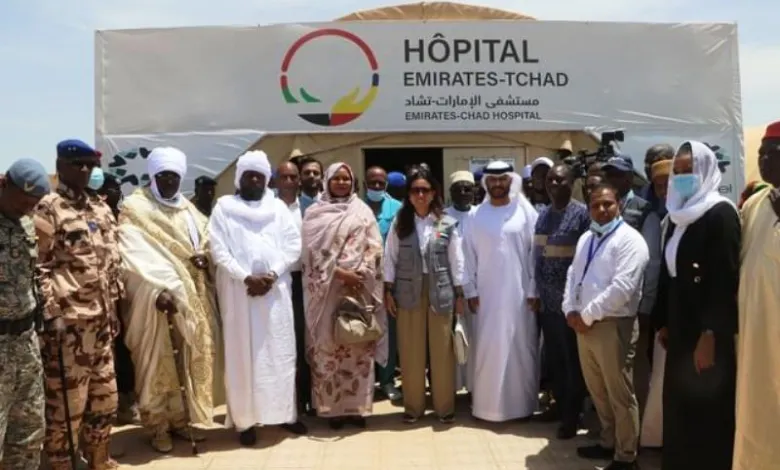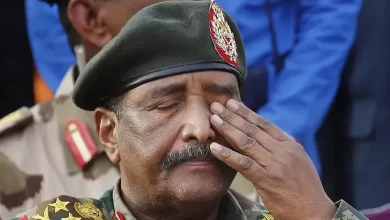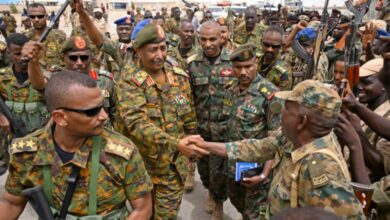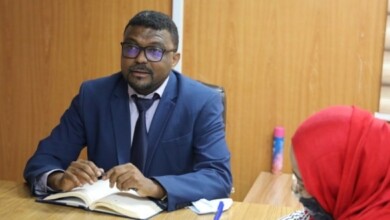UAE announces initiative to support women affected
by conflict in Sudan

The United Arab Emirates announced the launch of new humanitarian initiatives in Chad, and a contribution of ($10.25) million to the United Nations to support Sudanese refugee women affected by the ongoing crisis in Sudan.
The announcement of the initiatives came during a visit by Assistant Foreign Minister for Political Affairs and Special Envoy of the Minister of Foreign Affairs Lana Nusseibeh to Chad on Friday, the 13th of September, where she and members of the accompanying UAE delegation met with Sudanese refugee women in Chad who are affected by the current conflict, as well as with civil society leaders from the Sudanese people, and UN agencies participating in providing humanitarian support.
The delegation also met with the Minister Plenipotentiary at the Chadian Ministry of Foreign Affairs, Fatima Al-Jinah Jarfa, and the Governor-General of Wadai State, Bashar Ali Suleiman.
Challenges of Aid Distribution
The UAE delegation received a field briefing on the challenges related to the distribution of humanitarian aid in some areas of Sudan where armed conflict and famine are raging, and the progress made in delivering humanitarian aid.
The delegation also conducted fact-finding visits to humanitarian sites, including a Refugee Assistance Center and a field hospital in (Abéché), which the UAE had previously built to provide treatment to Sudanese refugees fleeing the conflict.
According to the Emirates News Agency on Saturday, the ($10.25) million will be provided to UN agencies with expertise in providing support to women, with ($3) million allocated to the World Health Organization to support the health of mothers and children of Sudanese refugees in Chad.
In addition, ($2) million will be allocated to the United Nations Population Fund (UNFPA) for women’s health programs and gender-based violence programs for Sudanese refugees, with ($250,000) allocated to support the gender response program in Chad within the United Nations World Food Programme (WFP).
The United Arab Emirates will provide ($3) million of the contribution to the United Nations High Commissioner for Refugees (UNHCR) for programs to enhance social cohesion between Sudanese refugee women and Chadian women in the host community. Moreover, ($2) million will be allocated to the Women’s Peace and Humanitarian Fund (WPHF), which directly funds women-led civil groups.
An Unwavering Commitment
Reem bint Ebrahim Al Hashimy, Minister of State for International Cooperation, stated: “With this additional contribution, the UAE reaffirms its unwavering commitment to support those affected by conflict, especially women and children, who are often the most vulnerable groups. The UAE’s efforts in Chad, in collaboration with our international partners, highlight UAE’s comprehensive approach to humanitarian assistance, which prioritizes immediate relief support to empower communities and prepare them for the future,” adding: “We would like to thank our partners and civil society organizations, and affirm UAE’s willingness to provide continued support to ensure that these essential resources reach those in need effectively and immediately,” she added.
For her part, Lana Nusseibeh stated, “The UAE delegation’s visit and the allocation of ($10.25) million reflect the State’s steadfast commitment to addressing the needs of women affected by the Sudanese crisis. We are here today to ensure that the support provided directly addresses the needs of those affected and to enhance humanitarian efforts. Our approach focuses on listening to women affected by the crisis and ensuring that our assistance effectively addresses their immediate and long-term needs.” Adding: “This funding and our visit highlights UAE’s commitment to empowering women and supporting regional stability. Sustainable peace in Sudan will not be achieved without the active participation of women.”
Chad is the largest host country for Sudanese refugees, having received (630,752) refugees since April 2023, with women and children making up (89%) of registered refugees.





